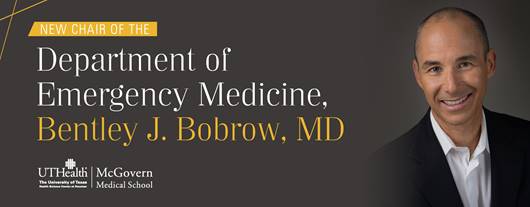Dr. Ben Bobrow joins Emergency Medicine as Chair
Following a national search, Dean Barbara J. Stoll has named Bentley J. Bobrow, MD, chair of the Department of Emergency Medicine, effective June 1, 2019.
Bobrow joins McGovern Medical School from the University of Arizona College of Medicine, where he was professor of emergency medicine, associate director of the Arizona Emergency Medicine Research Center, and medical director for the Arizona Department of Health Services Bureau of EMS and Trauma System.
“We are thrilled to have Dr. Bobrow lead our Department of Emergency Medicine,” said Dean Stoll, H. Wayne Hightower Distinguished Professor in the Medical Sciences. “Dr. Bobrow’s national reputation and extensive experience both in frontline research and community integrated care will further enhance our emergency department’s upward trajectory; its culture of collaboration; and its commitment to excellence in teaching, clinical practice, and research.”
Bobrow will serve as the physician leader responsible for overseeing emergency medical care at Memorial Hermann-Texas Medical Center, which is home to the Red Duke Trauma Institute, one of the nation’s busiest Level I trauma centers. Department of Emergency Medicine physicians also see patients at Harris Health System’s Lyndon B. Johnson Hospital, which has the state’s busiest Level III trauma center, with more than 70,000 emergency patient visits each year.
Bobrow sees the potential to “harvest synergies through rich collaborations with research colleagues across UTHealth.”
“Our Department of Emergency Medicine has an essential and expanding mission here in Houston and across Texas at large,” said Bobrow, whose research focuses on out-of-hospital cardiac arrest, acute stroke, traumatic brain injury (TBI), and improvement of access to high-quality emergency care. “We are confronting major public health challenges, from acute cardiovascular and traumatic events to substance abuse and behavioral health emergencies across our community. These challenges require continued advancements to improve care and save lives in the most time-sensitive medical emergencies.”
Bobrow is past chair of the American Heart Association’s Basic Life Support Subcommittee, co-author of the Institute of Medicine’s report on cardiac arrest, and principal investigator of the National Highway Traffic Safety Administration’s CPRLifeLinks Program. He earned his medical degree at Thomas Jefferson University and completed his residency at Maricopa Medical Center in Phoenix, Arizona.
“The opportunity to enhance emergency medicine care through the integration of evidence-based practices and public health policies is a great prospect and challenge,” Bobrow said. “We aim to build ‘Texas CARES,’ expanding the Cardiac Arrest Registry to Enhance Survival network to 9-1-1 agencies, EMS agencies, and hospitals statewide as the first step to measure and improve cardiac arrest care and outcomes across Texas.
“We have a world-class research team conducting federally funded, multicenter studies that are changing the face of emergency medicine,” he said. “Our next goal is to establish the first UTHealth emergency medicine research center that focuses on innovating and disseminating new and better emergency care interventions to save lives.”
Bobrow’s most recent study, published in May’s issue of JAMA Surgery: the Journal of the American Medical Association, showed that implementation of the nationally vetted prehospital TBI treatment guidelines doubled survival rates for patients with severe TBI and tripled the survival rates among patients with a breathing tube inserted. The study, with nearly 22,000 TBI patients, was one of the largest of its kind.
“The first few minutes of care in an emergency impacts both the patient’s survival and ability to return back home with their families after TBI,” said Bobrow, a co-investigator of the study. “Often this means more than just purchasing the latest high-tech devices – it requires the meticulous training, implementation, and rigorous evaluation of techniques for all rescuers caring for patients, including the general public, who are often the first responders before EMS rescuers arrive.”
Samuel Luber, MD, MPH, and Samuel Prater, MD, served as interim chairs of the Department of Emergency Medicine during the national search. “I want to thank our interim leadership, the Sams, for their incredible contributions during this transitional time,” Stoll said. “They will both continue in key emergency medicine leadership roles.”
